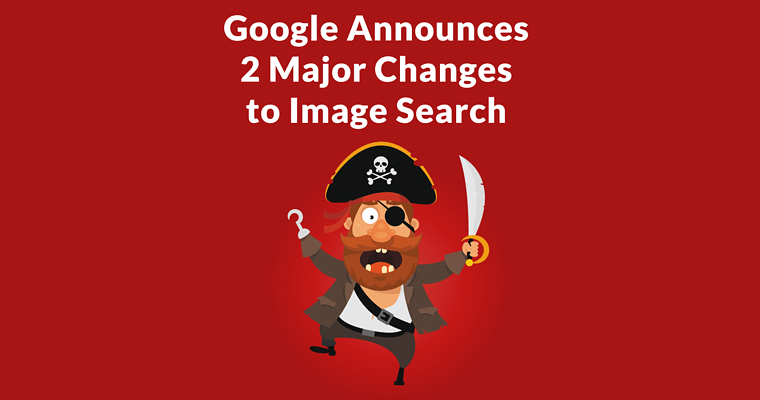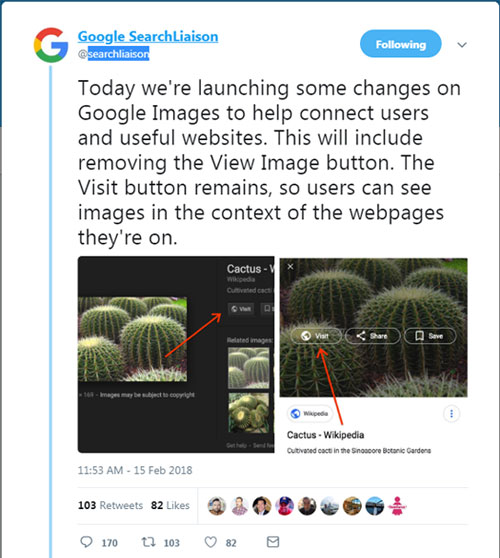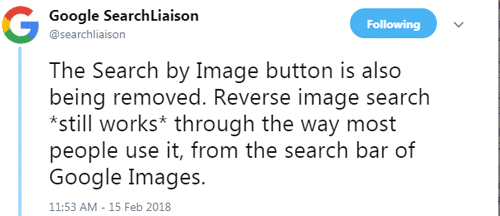
Google officially announced major changes to how image search functions. The announcement was made on Twitter by Danny Sullivan’s Twitter alias, @searchliaison. There are two changes. The first change is to remove Google’s “view image” button. The second change is to remove the “search by image” button. The impact to web publishers is expected to be positive and web publishers greeted the news on Twitter with applause. Google search users reacted negatively.

Google
informally announced the change on Twitter instead of via a formal blog
post. Was it because Google was forced to make the change and are
unhappy about it?
Google Forced to Remove the View Image Button
Many web publishers disliked the view image button for a long list of reasons. But perhaps the most important reason is that many publishers felt that Google’s view image button helped content thieves steal their images. In fact, Google may have been forced to remove the view image button as part of a settlement of a legal complaint by stock photography company, Getty Images.In a press release Getty Images announced a “partnership” with Google. According to the announcement, Google is licensing images from Getty Images.
“This agreement between Getty Images and Google sets the stage for a very productive, collaborative relationship between our companies,” said Dawn Airey, CEO, Getty Images. “We will licence our market leading content to Google, working closely with them to improve attribution of our contributors’ work and thereby growing the ecosystem.”Google’s official line on Twitter acknowledges that the changes were forced on Google through the settlement, which might explain why Google chose to announce this informally through Twitter instead of through a typically cheerful blog post. Here is the text of the official tweet:
“For those asking, yes, these changes came about in part due to our settlement with Getty Images this week (see also theverge.com/2018/2/15/1701…). They are designed to strike a balance between serving user needs and publisher concerns, both stakeholders we value.”
Google Image Search Accused of Encouraging Piracy
In April 2016 Getty Images filed a complaint against Google with the European Commission, alleging that Google’s image search was aiding the theft and piracy of copyrighted content.“Getty Images’ complaint focuses specifically on changes made in 2013 to Google Images, the image search functionality of Google, which has not only impacted Getty Images’ image licensing business, but content creators around the world
These changes have… allowed Google to reinforce its role as the internet’s dominant search engine, maintaining monopoly over site traffic, engagement data and advertising spend. This has also promoted piracy, resulting in widespread copyright infringement, turning users into accidental pirates.”
Publishers React Positively to Removal of View Image Button
Web publishers on WebmasterWorld reacted positively to the news as word of the announcement trickled out. Here are typical reactions:“Certainly good news IMO.”
“The button was there this morning when I checked. But now its gone. This seems positive.”
Publishers also reacted positively on Twitter:

Will this Move Benefit Web Publishers?
At
this point it is uncertain how this will impact web publishers. It is
anticipated that the removal of the view image button may encourage
visits from users who are viewing the images. This should have a
positive impact on publishers, especially stock photography businesses
that rely on the purchase of copyrighted images.
Search by Image Function Also Removed
Tucked away in the announcement of the view image button was a second announcement via Twitter that the search by image function was also being removed. Here is a screenshot of Google’s official tweet:

The
impact of this specific change is likely to slow down the discovery of
images for image content piracy. Although as Danny Sullivan noted above,
the full functionality is not entirely gone. Web publishers may welcome
this change as well because it may slow down image theft by making it
harder to discover new content.
Takeaways and Summary of Changes to Image Search
The
full impact to web publishers remains to be seen. It is anticipated
that the changes will ultimately be positive for publishers. How far
this will go to reduce image theft and piracy is unknown.
Google could have been the good guys in this story if they had heeded web publisher concerns about content piracy.
Instead it took legal action to force Google into making this move. The
involuntary aspect may account for the less than enthusiastic nature of
the announcement and Google’s choice to to informally announce it via
Twitter.
No comments:
Post a Comment